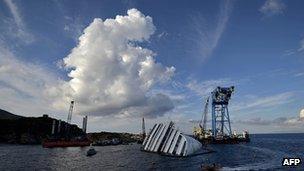Costa Concordia: 'Hand of God' saved lives
- Published

Only "the hand of God" prevented far greater loss of life in the sinking of the Costa Concordia cruise ship, which hit rocks off the Italian coast in January, a hearing has heard.
Momentum and a prevailing wind stopped the ship sinking fast in deep water, said prosecutor Francesco Verusio.
Captain Francesco Schettino argues that by guiding the vessel into shallow water, he helped to save many lives.
He may face multiple charges of manslaughter after 32 people died.
The captain is also accused of causing a shipwreck and abandoning ship before all passengers were evacuated.
Court-appointed experts have heaped blame on the captain for sailing the huge ship too fast and too close to the shore at night.
Black box data
After hitting rocks off the tiny island of Giglio the vessel had no propulsion, and its rudders were jammed, Mr Verusio told the Grosseto hearing on Wednesday.
"It was the hand of God that drew the Costa Concordia towards Giglio island after the collision with the rocks at Giglio, not Capt Schettino's manoeuvre," he said.
"If there was no wind that night, the ship would have capsized and sunk in a minute (with 4,200 people on board)."
Capt Schettino and eight others, including three executives from the ship's owner Costa Crociere, are under investigation.
Now into its final phase, the pre-trial investigation into the sinking will determine whether they should be put on trial.
For months, experts have been dissecting the smallest details of the disaster, and now they are setting out their findings formally to a judge.
Once the inquiry has finished sifting through a great mass of evidence, the judge is expected to decide on what shape a criminal trial will take - who will be charged and with what, says the BBC's Alan Johnston in Grosseto.
Much of what the judge will hear is already known, as the experts' report has been made public.
Capt Schettino had been trying to carry out a spectacular, night-time, sail-past salute to people on Giglio, the experts say.
In public statements, Capt Schettino has accepted a degree of responsibility.
He apologised, asked for forgiveness and wept during a television interview as he talked of those who died.
He says he managed to steer his stricken vessel close into shore, preventing it from sinking in deep water where hundreds might have drowned.
He was not compelled to attend the hearing, but had said he wanted to be able to confront those building the case against him.
The experts say some blame for the way the disaster unfolded must be attached to the cruise ship company's shore-based crisis management team.
It should have had a better understanding of what was going on, they say, and it should have given the captain better advice.
Data from the black box of the ship will be revealed during the hearing. Any subsequent trial is not expected to held until 2013.
Meanwhile, the shipwreck remains in the water off the Tuscan coast. Salvage crews are working to stabilise and refloat the hulk, which is expected to be removed by spring 2013.